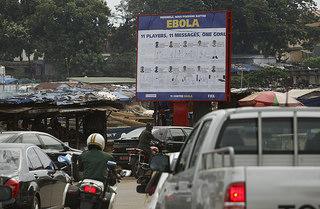With three new cases, Guinea was the only country in West Africa's outbreak region to report Ebola infections last week, and responders are on high alert because all of the confirmed case-patients, one of them a taxi driver, pose a high risk of transmission.
The World Health Organization (WHO) said in its weekly snapshot of the outbreak that Sierra Leone has gone 2 weeks without a new case and that the outbreak region's weekly total has remained at three for 4 weeks in a row.
Guinea patient details
All three of Guinea's new cases are from Conakry, a sign that the outbreak's footprint has shrunk but that transmission is also still a threat, given the urban setting. The WHO said all three of the cases are from the city's Ratoma area.
One of the patients is a 40-year-old taxi driver who wasn't on a known contact list, and he is believed to have worked for a short time while he had symptoms. The second patient is a male healthcare worker who treated the taxi driver at a private clinic. His illness marks the first healthcare worker infection to be reported in 4 weeks and lifts the overall total to 881, including 512 deaths.
The third patient is a woman who was a registered contact of an earlier case-patient in Conakry but had been lost to follow-up. Investigators found that the woman traveled to visit a traditional healer in Dubreka district before she died in a community setting rather than in a treatment facility.
In a promising development for Guinea, the country's number of contacts under monitoring dropped from about 800 to roughly 600 last week. Sierra Leone's contact monitoring total also declined last week, from 72 to 29.
Earlier this week, Sierra Leone's last known Ebola patient was released from treatment, marking the start of the country's 42-day countdown to Ebola-free status.
The WHO put the overall Ebola outbreak total at 28,005 confirmed, probable, and suspected cases, 11,287 of them fatal.
Vaccine and treatment developments
An Ebola ring vaccination trial under way in Guinea is being expanded to research sites in Sierra Leone, according to an Aug 24 AllAfrica News report that cited a WHO official. Researchers conducting a trial of VSV-EBOV ring strategy in Guinea in late July reported it to be highly effective. The vaccine was so effective that experts recommended that all rings of contacts should be immediately vaccinated upon detection of a new case, rather than some receiving the delayed vaccine (these patients made up the randomization group in the study).
The VSV-EBOV vaccine uses an Ebola protein spliced into a vesicular stomatitis virus (VSV). It was developed in Canada and is licensed by NewLink Genetics and Merck. Ring vaccination helped eradicate smallpox in the 1970s, and experts hope the tactic will help snuff out any future Ebola hot spots.
Dr. Margaret Lamunu, a WHO Ebola technical coordinator for Sierra Leone, told AllAfrica that a team from the country's health ministry and the WHO visited five study sites before deciding to extend the ring vaccine trial to Sierra Leone.
In other developments, British researchers yesterday reported findings from a small trial involving postexposure prophylaxis (PEP) and use of an assessment algorithm in eight healthcare workers who were evacuated from West Africa after possible Ebola exposure. Their report appears in the latest online edition of The Lancet Infectious Diseases.
Noting that there is a need for a way to systematically assess health workers after accidental exposure to Ebola, they described a risk-assessment method and use of antiviral agents for PEP. Their study covered eight consecutive workers who were evacuated from the outbreak region between January and March. Four had low-risk exposure and were monitored in the community. Four had moderate or maximum exposure and were given antiviral PEP. The drug was oral favipiravir, a Japanese-made agent, started shortly after exposure and given for 10 days. Two patients also received intravenous monoclonal antibodies starting on day 2.
None of the patients got sick with Ebola; including two who had maximum risk from injuries caused by hollow-bore needles that had been freshly used on Ebola patients The team found that PEP was well tolerated.
See also:
Aug 26 WHO Ebola situation report
Aug 24 AllAfrica report
Aug 25 Lancet Infect Dis abstract



















